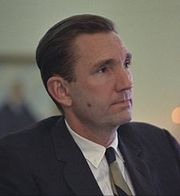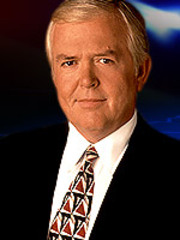Earlier I offered you a tough question.
Politically, who does Ramsey Clark best represent now?
Clark, who turns 80 later this year, has spent half his lifetime in the political wilderness. Yet in 1967 he was government’s Golden Boy. He was the son of U.S. Supreme Court Justice Tom Clark, and was appointed as Attorney General by President Lyndon Johnson.
He didn’t change. America changed. Ramsey Clark in 1967 represented what those who followed the FDR Thesis of Unity considered attractive ideals — civil rights, civil liberties, an expansion of American exceptionalism. These ideas were roundly rejected by American voters in 1968, who came to equate civil rights with black crime, and civil liberties with hippie-dom. Clark did not help himself with these people when he rejected the Vietnam War.
Yet it all seemed so right at the time. A generation later American liberals still look back to that moment and ask, what went wrong? We were so close to really changing things. All our stands were popular. Being against Vietnam was popular. Being against racism was popular. The Beatles were popular.
What went wrong is that, in all these areas, American liberals went ahead of where businesses wished to go. Business supported the Cold War, because the Cold War supported them. Businesses prized elitism over egalitarianism, and demanded that institutions be protected, not attacked.
So enough with the hints. Do you have your answer ready?
Immigration is the great chimera. Lou Dobbs is Ramsey Clark. Government power was the pinnacle of influence in 1967. Television is the pinnacle of such influence today.
The immigration issue is doing the same thing to the Republican coalition that Vietnam did to the Democratic coalition. The split is real, it is widening, and since every party must follow its base, it is going to result in the Republican Party going nativist in 2008.
This may or may not result in a nativist candidate at the top of the ticket. After all, Hubert Humphrey still supported the War in Vietnam when he was nominated for President in 1968.
But there is more to the Dobbs comparison than that.
While Lou Dobbs gives lip service to the ideology of Republicanism, his main foe is corruption. (He insists on calling himself an independent, calling a pox on both houses. Which means, like the hippies, he can not create, only destroy.) Business corruption as well as government corruption is his theme. Businesses don’t like corruption paraded publicly — they prefer a quieter approach. Lou Dobbs hates the quiet approach, and his audience loves him for it.
On all the issues of the day, in 2007, Lou Dobbs appears to be right. Well, Right anyway. But as I’ve often said, extremism in the defense of liberty is a vice, for in extremism there can be no liberty.
If you’re a Democrat, cheer Lou Dobbs on quietly. He’s breaking the Nixon Coalition into pieces, tearing it to shreds, doing your own work for you. Lou Dobbs is a political dead-end.
Which is why Democratic politicians are so quiet right now.












